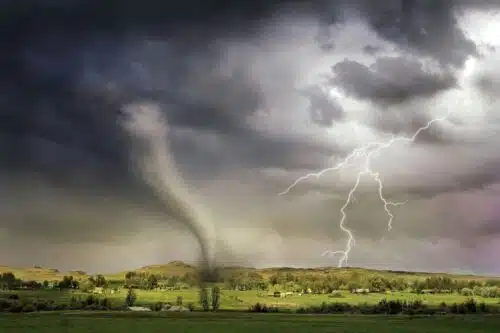Extreme Weather and Its Alarming Impact on Autism Emotions
 Weather is one of the biggest problems facing the world right now and for the future because of the unpredictable nature of it.
Weather is one of the biggest problems facing the world right now and for the future because of the unpredictable nature of it.
For example, how will extreme heat, white-out blizzards, major thunderstorms, earthquakes, tornados, and whatever else Mother Nature may throw at us affect people, both physically and mentally? And will these significant weather events have a greater impact on individuals on the spectrum with their various autism emotions?
The increasing frequency of extreme weather and its impact of climate change in human health is a trending topic and has a direct impact on so many people across the globe.
As an autistic myself, I’m guessing individuals on the spectrum will find severe weather events harder to cope with and adapt to because it is against their general nature to prefer consistency and routine.
Explaining weather in a way that is relevant and understood by all, along with steps that humanity should take to help manage these weather events, is one of the greatest challenges facing the world today. While the environmental impacts like rising temperatures, extreme weather activities, and loss of biodiversity are widely discussed, there is another group potentially being profoundly affected that often gets overlooked—individuals with autism spectrum disorder and sensory processing issues like autism sound sensitivity.
For those unfamiliar, autism is a neurodevelopmental condition that affects communication, social interaction, and behavior. Many individuals on the autism spectrum also experience sensory processing differences, meaning they have a difficult time integrating information from the five senses.
Loud noises like thunder impact autism sound sensitivity and being scared of the rain, bright lights like lightning during storms, certain textures, and strong smells can be overwhelming and trigger autism emotions. These scary and sudden weather elements can produce anxiety, meltdowns, and even physical pain.
So how exactly does the impact of climate change in human health impact this vulnerable population? In several major ways:
Sensitivity to Heat Causes: Excessive Temps and Cooling Challenges When Sensitive to Heat
With escalating summer temperatures due to the greenhouse gas effect, heat waves are becoming more frequent and intense across many parts of the world.

For individuals with autism heat sensitivity, excessive heat can be agonizing both physically and mentally. Simple exposure to very warm temperatures can create sensitivity to heat causes like emotional distress, meltdowns, self-injurious behavior, and a worsening of other symptoms.
Many public buildings, schools, and homes lack adequate cooling and temperature control. When an unexpected heat wave strikes, there are few refuges for autistics who experience a painful level of discomfort with autism heat sensitivity.
Some may refuse to leave hot rooms, unable to find relief. Parents are faced with the choice of keeping their overheated child at home, missing work and school or subjecting them to misery. Adults may also miss work or activities due to being sensitive to heat as well.
Beyond the heat itself, power outages from elevated energy demand can disrupt preferred routines and cooling mechanisms. Autistics often struggle when their familiar schedules and habits are disrupted. Having the A/C or fans stop working during a heat wave can quickly escalate into a crisis for families due to being sensitive to heat.
This challenge of sensitivity to heat causes could become more prevalent in the coming decades if our planet continues to warm. Many cities are investing in accessible cooling centers, green spaces, and affordable home installations like HVAC units and window protections for vulnerable populations.
Extreme summer planning is a priority for schools and support services for children with special needs and anyone sensitive to heat.
Autism Sound Sensitivity: Severe Weather and Need for Routine
The erratic, destructive weather patterns brought on by climate change – hurricanes, floods, wildfires, and more – inevitably disrupt routine and shelter, two critical needs for many individuals (children and adults alike) on the spectrum.
People with autism often rely heavily on predictable schedules, familiar environments, and stable living situations to feel secure. The chaos created by these extreme weather events can be highly traumatic and explaining climate change isn’t always effective.
When emergency evacuations are required, some autistics, especially those who have a deep fear of tornados or other weather events, may become non-verbal or engage in self-injurious behaviors out of distress. Other common reactions are aggression, meltdowns, shutdowns, and refusal to leave familiar spaces.
The process of seeking shelter, being surrounded by disruptive noises and crowds, and completely upending one’s schedule can be incredibly dysregulating. It can take weeks or months for routines and a sense of stability to be re-established.
Then there are instances where families are suddenly displaced from their homes due to climate disasters, being forced into unfamiliar long-term shelters, or new living situations that can be nightmarish for anyone, but especially for those with autism.
Sleep patterns are disrupted, food is unpalatable, and a lack of safe spaces to stim (repetitive self-soothing behaviors) creates constant anxiety. For these autistics who struggle with change, each step of the displacement cycle brings new challenges.
READ MORE: Overwhelmed Meaning – How to Cope When Stressed Beyond Belief
My Autism Emotions Abound With Weather Disruptions

While by no means extreme, I can relate to certain autism emotions and fears such as how sensitivity to heat causes me to “melt.”
I live in Texas, and we have experienced temperatures above 113 degrees Fahrenheit in the summer and winter weather that took out the power and forced us to live in an unheated and no-power home for over a week while temperatures were in the single digits.
In addition, we’ve had several major lightning strikes that burned down two homes in our neighborhood, hail the size of softballs (yes, literally), and stay weather-aware of tornados that occur frequently. Alerts of deadly tornados go off every tornado season (I live in the so-called “Tornado Alley” area, and those loud sirens, while needed, can be triggering for those with autism sound sensitivity.)
I haven’t experienced a major tornado (at least yet), although both my parents have. I was swimming in the ocean near Galveston a few years ago when a water spout suddenly appeared and I watched it grow in size across the water, causing damage to homes. (Yes, I got out of the water!)
In addition, my sister who is less than two years older than me, had to evacuate to a restaurant’s freezer area for safety as a tornado went directly overhead when she was at a pizza place when she was younger. While it hit nearby businesses, the restaurant she was at was thankfully spared. However, she is still terrified of storms today.
In addition, I have been in areas such as Seattle, Wash., and Texas during some very major wildfires where the smoke was so thick at times that it was difficult to breathe. I felt autism emotions like anxiety over all these climate events.
Families and caregivers should have emergency plans and resources specific to their child’s needs. Adults on the spectrum need the same. This could include guides and accommodations for shelter workers on how to support individuals with autism, sensory aids, comfort objects for stressful situations, and backup housing arrangements with friends or relatives.
More needs to be done to prioritize assistance for special needs families after climate disasters that lead to fear of tornados, being scared of the rain, and terrified of earthquakes, hurricanes, floods, or other natural disasters.
Autism Emotions: Food Insecurity and Limited Diets and Explaining Weather Destruction
Rising temperatures, droughts, and other climatic changes are already threatening certain food supplies in many regions, causing spikes in food insecurity. This global issue directly impacts individuals who commonly experience limited diets and specific food preferences due to their sensory issues.
Though reasons vary, it is extremely common for autistics to have highly restrictive diets due to aversion to certain tastes, smells, colors, textures, or brands.
An autistic or someone with high dietary preferences or restrictions may only be able to tolerate one type of bread or form of a specific food. Deviations from their accepted foods, even something as small as a change in shape or packaging, can cause extreme distress, refusal to eat, or vomiting.
With climate change diminishing reliable access to many food sources, some individuals face the very real risk of running out of their narrowly accepted foods. Processed and packaged foods could become difficult to obtain, fruits and vegetables spoiled by temperature changes, and supply chains disrupted.
Air Quality and Respiratory Issues: Impact of Climate Change in Human Health

Diagnoses of asthma and other respiratory disorders is substantially higher among those on the autism spectrum. Irritants, airborne particulates, and chemical pollutants can directly exacerbate these conditions, leading to breathing emergencies.
Also, poor air quality and strong odors associated with things like wildfire smoke can be overpowering for those with sensory processing differences. The inability to filter out overwhelming smells and irritants could instigate meltdowns, make environments intolerable, and cut off access to outdoors and other crucial spaces. Sensitivity to heat causes many issues among autistics and other individuals with sensory issues as well.
As sensitivity to heat causes like smog, high temperature, and wildfires grow more intense, air quality is only projected to worsen across many populated areas. Individuals on the spectrum should have mitigation plans that could include enhanced air filters, alternative sheltering abilities during polluted periods, high-powered fans, and access to respirator masks.
Monitoring systems and guidelines from health agencies need to be updated to account for susceptible groups like those with autism when issuing public warnings.
Explaining Severe Weather and Its Effects on Future Generations
The toll of climate change and/or destructive weather events on the autism community will undoubtedly have ripple effects across generations. Children with autism who face disruptions, trauma, and increased health risks from environmental upheaval will carry those impacts into adulthood.

As adults, individuals with autism already face higher rates of unemployment, insufficient social support networks, housing insecurity, and lack of access to services.
Layering on additional challenges from climate change could make achieving independence, stable employment, and quality of life even more daunting in certain regions. Loss of routines, resources, or in-home care providers due to extreme weather or economic pressures could significantly impact some.
There are also potential developmental impacts to consider. Some studies have found links between exposure to heat, air pollution, and other environmental stressors during pregnancy and higher risks for autism and developmental delays in children.
Findings suggest that as these exposures increase with climate change, we may see rising rates of new autism diagnoses.
Sensitivity to Heat Causes and Autism Emotions: Building Resilience For All
The convergence of the climate crisis and the needs of the autism and disability communities deserves urgent attention and action. More to adopt a mindset of building societal resilience that is truly inclusive of all neurotypes and ability levels. That means bringing these diverse voices and lived experiences into local, national, and international planning and policymaking.
There is still much to be studied about the intersection of climate impacts and autism. More research is needed into unique sensory and physiological vulnerabilities, as well as which specific accommodations and mitigation strategies will be most effective.
We have the opportunity to create a more prepared, understanding, and supportive society that uplifts vulnerable populations. Together, we can collectively brace for the changing climate while protecting every community’s fundamental needs.
Organizations like the Autism Society and many local support groups are already advocating for autism inclusion in climate action plans. They need allies from climate activists, policymakers, scientists, healthcare workers, and caring citizens. These are the stakeholders who can drive meaningful change through collaboration.
On an individual level, building resilience may look like anything from enhancing home insulation and backup power sources to connecting with disability organizations and local emergency preparedness officials. It could also mean volunteering time or funding to groups supporting autistic families through climate-related crises. Even simple acts of being an informed advocate, showing kindness to overwhelmed parents, or lobbying for inclusive policies can create an impact.
The goal should not be mere survival through climate calamity, but the flourishing of every life regardless of cognitive or physical variation.
Solutions to Autism Emotion As It Relates to the Impact of Climate Change in Human Health
Whether it’s the physical and emotional impact of climate events, or cascading societal effects like poverty, and conflict, autistics are often uniquely vulnerable to the consequences of environmental upheaval.
Whenever possible, try to minimize disruptive exposure. That may involve everything from installing home air filters and backup generators to stockpiling shelving foods for sensory-limited eaters. Create an emergency preparedness plan uniquely tailored to particular needs, including resources like rescue prompts or accessibility accommodation at shelters and facilities.
Advocacy and activism from the autism and disability communities will be crucial forces of change.
At the convergence of the climate crisis and the autism community lies an under-explored layer of adversity in desperate need of awareness, resources, and solution-focused commitment. We must build a more resilient, accommodating world in the face of a changing environment.
The clock is ticking not just for the planet, but for generations of neurodiverse individuals and their families.
Additional Challenges Individuals with Autism Face
Learn more about other issues that autistics face:
- Autism and Organization: The Secret to Finding Calm in the Chaos
- New Research Reveals Autism Mental Health Linked to These Disorders
- Is Autism a Disability? Surprising Reasons for the Debate
- Social Justice Issues: Why Disability Rights Matter for Autistics
- Autism and Holidays: Why Special Occasions Can Be Challenging
- 6 Fascinating Facts About Autism You Probably Didn’t Know
- 8 Popular Ways to Manage and Master Autistic Social Awkwardness
- Autism and Poor Hygiene: The Smelly Truth to Overcome
- Breaking Down Barriers that Challenge Autism and Friendships
- Anxiety and Autism: 5 Powerful Strategies to Conquer Emotions
- 6 Ways to Tackle Autism Fireworks Anxiety and Sensory Overload
- Autism Clothing for Sensitive Skin Can Enhance Quality of Life
- Autism After High School: Is College the Next Step?